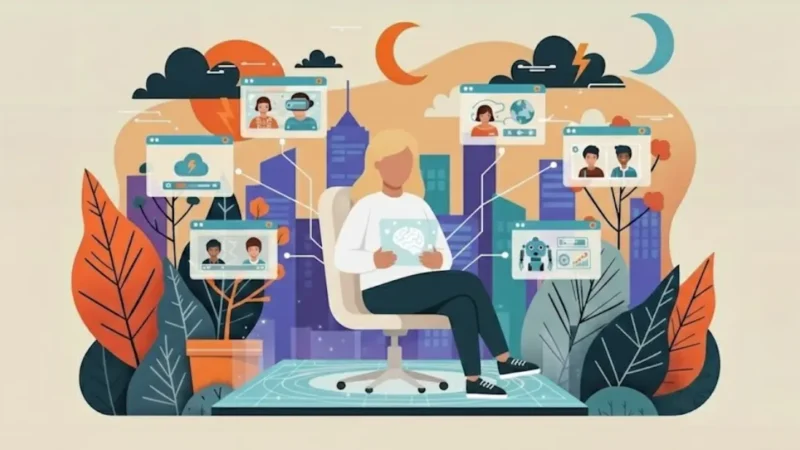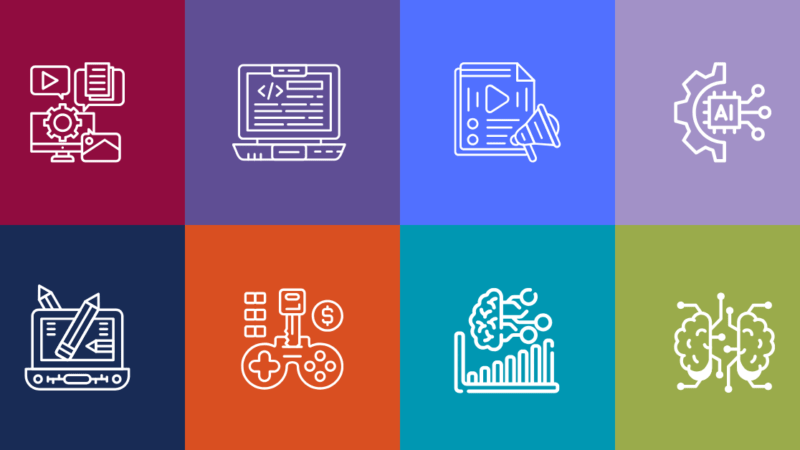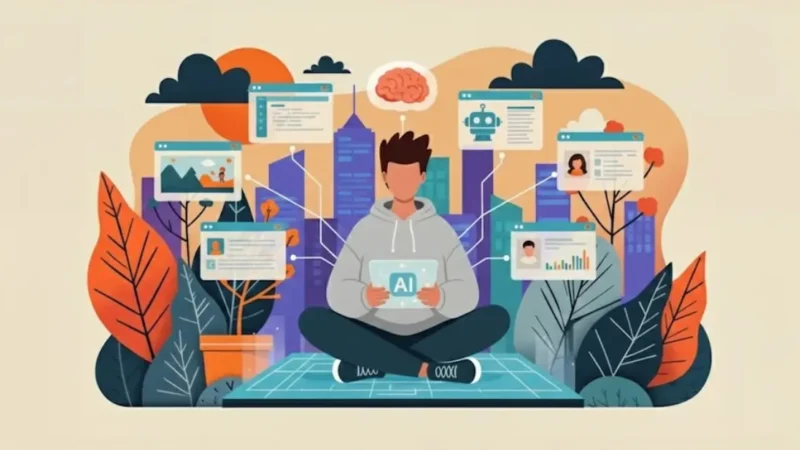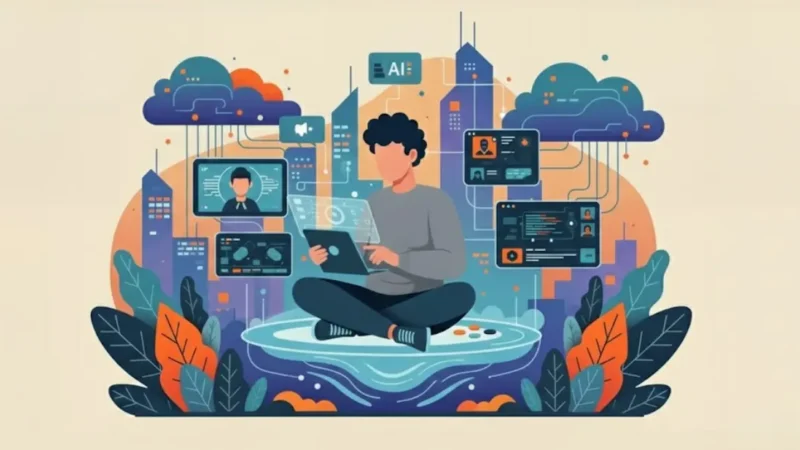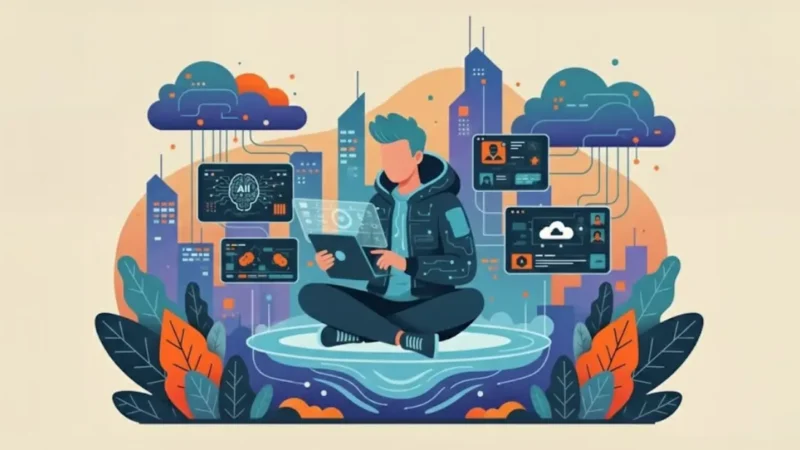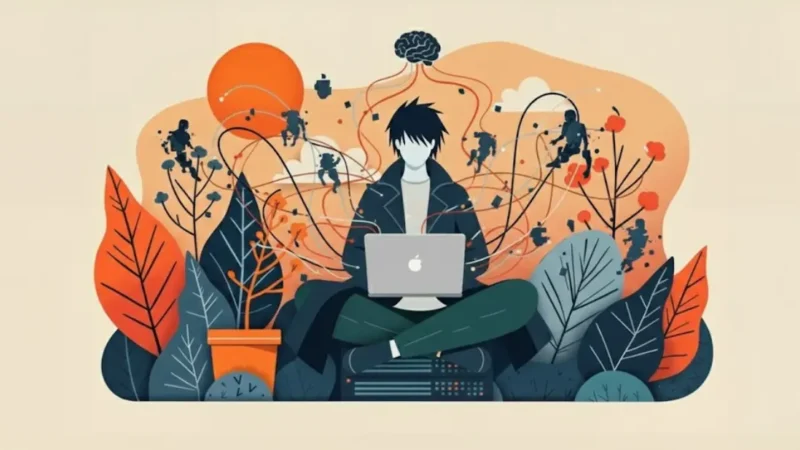When Will AI Replace Game Developers?
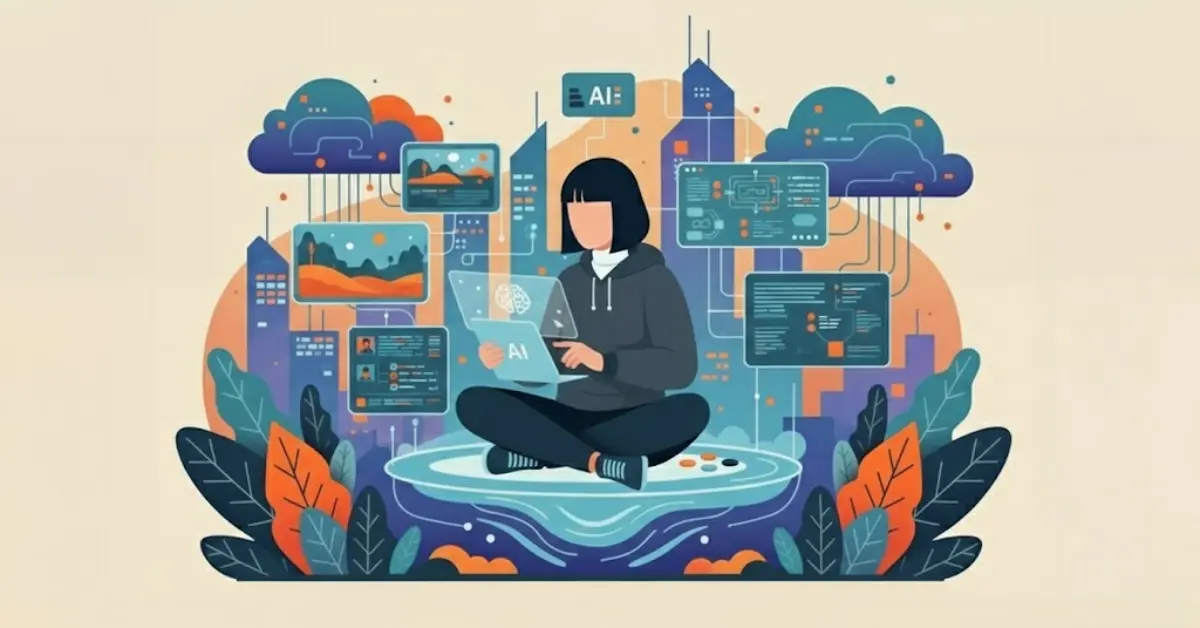
The gaming services industry stands at a crossroads. Artificial intelligence has sparked intense debate across development studios worldwide. Will AI replace game developers entirely? The answer isn’t simple.
Current data reveals that 73% of gaming studios already use AI tools in some capacity. However, this doesn’t mean wholesale replacement. Each developer role faces different levels of AI disruption.
This analysis examines how AI in gaming affects specific roles. We’ll explore programmers, artists, designers, writers, and QA testers separately. Each profession has unique vulnerabilities and strengths.
The reality? AI won’t replace all game developers equally. Some roles will evolve, others will disappear, and new opportunities will emerge. Understanding these differences helps developers prepare for the future.
Game Programmers: Automation’s Primary Target
AI game development tools now generate functional code rapidly. GitHub Copilot assists programmers daily. ChatGPT solves coding problems in seconds. These advances raise serious questions about programming careers.
Current AI Capabilities in Programming
Modern AI excels at routine coding tasks. It generates boilerplate code efficiently. Bug detection happens faster than manual review. Simple algorithms write themselves through prompts.
However, artificial intelligence in gaming faces significant limitations. Complex game architecture requires human oversight. System integration demands deep understanding. Performance optimization needs creative problem-solving.
Large-scale game engines involve thousands of interconnected systems. AI struggles with this complexity. Memory management requires nuanced decisions. Platform-specific optimizations need human expertise.
What Programmers Can’t Be Replaced At
Game programmers excel at architectural decisions. They understand player behavior patterns. Technical problem-solving requires creativity AI lacks. Team collaboration involves human communication skills.
Gaming news frequently highlights AI coding successes. But these examples focus on isolated tasks. Full game development involves intricate design decisions. Human judgment remains essential for complex systems.
Programmers also handle crisis management effectively. When servers crash, humans adapt quickly. Emergency patches require immediate decision-making. AI can’t match human flexibility in emergencies.
Adaptation Strategies for Programmers
Smart programmers embrace AI as a productivity tool. They use AI for repetitive tasks. This frees time for creative problem-solving. Focus shifts toward system architecture and design.
Learning AI integration becomes essential. Understanding machine learning principles helps programmers work alongside AI tools. They become AI supervisors rather than competitors.
Specialization in AI-resistant areas provides job security. Graphics programming remains complex. Network architecture requires deep expertise. These specializations will survive AI advancement longer.
Game Artists: The Creative Collaboration Challenge
Artificial intelligence for games has revolutionized art creation. DALL-E generates concept art instantly. Midjourney produces stunning game assets. AI art tools have democratized creative production.
This advancement terrifies many artists. Will machines replace human creativity entirely? The situation is more nuanced than initial fears suggest.
AI Art Generation: Current Capabilities
AI excels at specific artistic tasks. Concept art generation happens in minutes. Texture creation becomes automated. Style mimicry reaches professional quality levels.
However, AI art has notable limitations. Consistency across projects remains challenging. Brand identity requires human understanding. Cultural sensitivity needs human oversight.
Gaming services companies report mixed results with AI art. Initial concepts work well. Final polish requires human intervention. Client communication needs artistic expertise that only humans can provide.
Where Human Artists Remain Essential
Game art involves complex storytelling elements. Character development requires emotional intelligence. Environmental storytelling needs cultural understanding. These elements demand human insight.
Art direction involves strategic decision-making. Visual hierarchy guides player attention. Color psychology affects gameplay experience. These decisions require human creativity and judgment.
Artists also excel at iteration and refinement. They understand client feedback nuances. Revision processes involve subjective interpretation. Human artists navigate these challenges effectively.
The Hybrid Artist Workflow
Successful artists integrate AI into their workflow. They use AI for initial ideation. Human creativity guides AI outputs. This collaboration multiplies productivity while maintaining quality.
Artists become AI art directors. They curate AI-generated options. Quality control remains a human responsibility. The role evolves rather than disappears.
AI in gaming art production creates new opportunities. Artists can focus on creative direction. Technical execution becomes partially automated. This shift demands new skill development.
Game Designers: Strategy and Psychology Remain Human Domains
Game design involves understanding player psychology deeply. Artificial intelligence in gaming excels at data analysis. But translating data into engaging experiences requires human insight.
The Complexity of Game Design
Game designers balance multiple variables simultaneously. Player engagement curves require careful tuning. Difficulty progression needs psychological understanding. These elements demand human expertise.
AI can generate level layouts efficiently. Procedural generation creates endless content. However, meaningful player experiences require intentional design. Human designers understand emotional pacing.
Gaming news often highlights AI-generated levels. These examples focus on technical achievement. Player satisfaction requires deeper consideration. Emotional engagement remains a human strength.
AI as a Design Assistant
Smart designers use AI for rapid prototyping. Pattern analysis reveals player behavior trends. Data visualization helps identify design problems. AI becomes a powerful research assistant.
Procedural generation handles repetitive design tasks. This frees designers for creative work. Focus shifts toward player experience optimization. The role becomes more strategic and less tactical.
The Psychology of Player Engagement
Understanding player motivation requires human empathy. Cultural preferences affect game reception. Social dynamics influence multiplayer experiences. These factors need human interpretation.
Game designers study player behavior extensively. They understand frustration patterns. Reward timing affects long-term engagement. These insights come from human psychology knowledge.
Artificial intelligence for games can analyze player data effectively. But interpreting this data requires human understanding. Design decisions involve subjective judgments AI cannot make.
Writers and Narrative Designers: Storytelling in the AI Era
AI writing tools have improved dramatically. ChatGPT generates dialogue quickly. Story outlines appear in minutes. These capabilities worry narrative designers significantly.
AI Writing Capabilities and Limitations
Current AI excels at formulaic writing tasks. Dialogue generation follows predictable patterns. Basic narrative structures work adequately. Simple character interactions feel natural.
However, AI game development writing lacks emotional depth. Complex character development requires human understanding. Cultural nuances escape AI comprehension. Meaningful themes need human experience.
Game narratives involve intricate branching storylines. Player choice consequences require careful consideration. These elements demand creative problem-solving AI cannot match.
The Human Element in Game Narratives
Players connect with authentic human experiences. Emotional resonance requires genuine understanding. Cultural representation needs lived experience. These elements remain uniquely human.
Game writers understand pacing intuitively. They know when tension should build. Comedic timing requires human sensibility. These skills develop through human social interaction.
Gaming services companies value authentic storytelling. Players recognize genuine emotion quickly. Formulaic narratives feel hollow. Human writers provide authenticity AI cannot replicate.
Hybrid Narrative Development
Successful writers use AI for initial brainstorming. They generate multiple plot variations quickly. AI helps overcome writer’s block effectively. Human creativity guides the final narrative direction.
Writers become narrative architects. They design overall story structures. AI assists with detailed execution. This collaboration improves productivity while maintaining quality.
The role evolves toward creative direction. Writers focus on thematic development. Technical writing tasks become partially automated. This shift requires skill adaptation but preserves human value.
QA Testers: Automation’s Biggest Success Story
Quality assurance faces the most significant AI disruption. Artificial intelligence in gaming excels at repetitive testing tasks. Automated testing tools replace manual testing rapidly.
Current State of AI Testing
AI testing tools detect bugs efficiently. Regression testing happens automatically. Performance analysis runs continuously. These capabilities surpass human testing speed significantly.
Gaming news regularly features AI testing breakthroughs. Automated systems find edge cases humans miss. Testing coverage improves dramatically. Development cycles accelerate through automation.
However, AI testing has notable gaps. User experience evaluation requires human judgment. Accessibility testing needs a human perspective. These areas remain human-dominated.
The Shift Toward Exploratory Testing
Smart QA testers pivot toward exploratory testing. They focus on user experience evaluation. Creative problem-solving becomes their primary value. This shift requires skill development.
Human testers excel at understanding player frustration. They identify usability problems AI misses. Social interaction testing needs a human perspective. These skills remain valuable.
Artificial intelligence for games handles routine testing effectively. Human testers become experienced evaluators. They ensure games feel fun and engaging. This role evolution offers continued relevance.
Career Transition Strategies
QA professionals should develop user experience skills. Understanding psychology helps evaluate player satisfaction. Communication skills become increasingly important. These abilities resist AI replacement.
Learning AI tool management provides career stability. QA professionals can oversee automated testing systems. They become quality assurance architects. This evolution preserves career relevance.
Timeline and Predictions by Role
Different developer roles face varying replacement timelines. Understanding these differences helps with career planning significantly.
Near-term Changes (2025-2027)
AI in gaming will automate routine tasks first. QA testing sees immediate impact. Code generation assists programmers daily. Art production becomes partially automated.
However, creative roles remain secure short term. Game design requires human insight. Narrative development needs emotional intelligence. These skills resist immediate replacement.
Medium-term Evolution (2028-2030)
AI capabilities will expand significantly. Complex coding tasks become automated. Art generation reaches professional quality consistently. Testing becomes almost entirely automated.
Human roles evolve rather than disappear. Programmers become system architects. Artists become creative directors. The industry restructures around human-AI collaboration.
Long-term Transformation (2031+)
Artificial intelligence in gaming may revolutionize development entirely. Small teams could create AAA experiences. Individual developers might build complex games independently.
However, human creativity remains essential. Player connection requires authentic experiences. Cultural understanding needs a human perspective. These elements resist complete automation.
Preparation Strategies by Role
Each developer role requires specific adaptation strategies. Understanding these differences guides career development effectively.
For Game Programmers
Focus on system architecture skills. Learn AI integration techniques. Develop leadership capabilities. Specialize in complex technical domains.
Graphics programming offers resistance to AI replacement. Network architecture requires deep expertise. These specializations provide career security.
For Game Artists
Embrace AI as a creative tool. Develop art direction skills. Focus on storytelling abilities. Build client communication expertise.
Gaming services value authentic artistic vision. Develop unique creative perspectives. Build personal artistic brands. These approaches resist commoditization.
For Game Designers
Strengthen psychological knowledge. Develop analytical skills. Focus on player experience optimization. Build cross-functional collaboration abilities.
Understanding cultural trends helps design relevant games. Player psychology knowledge remains valuable. These skills complement AI capabilities effectively.
For Writers and Narrative Designers
Develop unique creative voices. Focus on cultural authenticity. Build interactive narrative expertise. Strengthen emotional storytelling skills.
AI game development cannot replicate lived experiences. Authentic perspectives remain valuable. Cultural understanding resists AI replacement.
For QA Testers
Transition toward user experience evaluation. Develop psychological understanding. Build communication skills. Learn AI tool management.
Accessibility testing requires a human perspective. User satisfaction evaluation needs human judgment. These areas offer career stability.
The Economic Reality: Jobs vs. Productivity
Artificial intelligence for games creates economic complexity. AI tools increase productivity dramatically. This could reduce overall employment needs.
However, productivity gains often create new opportunities. Historical technology adoption suggests job evolution rather than elimination. The gaming services industry continues to expand rapidly.
Gaming news reports consistent industry growth. Player demand increases globally. New platforms create additional opportunities. These trends suggest continued employment despite AI advancement.
Conclusion: Adaptation Over Replacement
Can AI replace game developers in 2025? The answer varies significantly by role. Complete replacement seems unlikely across all positions.
QA testers face immediate disruption. However, user experience evaluation remains human-dominated. Career evolution offers continued relevance.
Programmers see AI assistance rather than replacement. Complex system architecture requires human expertise. Adaptation strategies provide career security.
Artists become creative directors guiding AI tools. AI in gaming art production creates new collaboration opportunities. Human creativity remains essential for authentic experiences.
Game designers leverage AI for data analysis and prototyping. However, understanding player psychology requires human insight. The role evolves but remains valuable.
Writers focus on authentic storytelling and cultural representation. AI assists with technical tasks. Human experience provides irreplaceable value.
The key lies in adaptation rather than resistance. Developers who embrace AI as a collaborative tool will thrive. Those who resist change risk obsolescence.
Artificial intelligence in gaming represents opportunity as much as threat. Smart developers can multiply their capabilities through AI partnership. The future belongs to human-AI collaboration, not AI replacement.
Success requires continuous learning and adaptation. Developers must constantly evolve their skills. The gaming services industry rewards those who embrace change effectively.
The question isn’t whether AI will impact game development. The question is how developers will adapt to work alongside artificial intelligence. The answer determines individual career success in 2025 and beyond.

